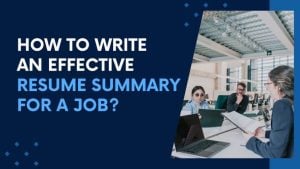Are Hiring Managers Still Reading Cover Letters in 2024?
 Publié le 19 June 2024
Publié le 19 June 2024
If you’re looking for work, you may find yourself asking are hiring managers still reading cover letters in 2024? The answer is yes, and they remain an important part of every job application.
It’s the modern age, and job applications are much different than they used to be – they can be made by AI, processed by automatic applicant tracking systems, and even shortlisted by software. So many job seekers are asking:
“Are hiring managers still reading cover letters?”
Applicants may doubt that a human ever sees their resume, so why include a cover letter? The truth is, hiring managers do read cover letters, and they’re an important part of the hiring process that could land them a great job.
In this guide, you’ll learn why cover letters are still necessary, their top benefits, and how to make a cover letter that strengthens your application and gets noticed.
Do employers still read cover letters?
It takes time to craft the perfect resume and then tailor it for each individual role – and we do recommend personalizing each one – so do you need to write a cover letter, too? Are hiring managers still reading cover letters?
The short answer is yes. Most hiring managers still read and appreciate cover letters. These documents give recruiters much-needed context and extra information for them to make a decision on, as well as give them a holistic view of who you are and what you’ll bring to their team.
Hiring is a difficult job when you receive thousands of applications, and keen recruiters know they need a lot of data to make an informed decision.
When do cover letters really matter?
It’s true that cover letters aren’t always a necessity. Some jobs even specify the contents of your application and explicitly ask for just a resume – some skills-based companies may not even ask for a resume.
However, there are a few scenarios where writing a cover letter is essential:
- The job description requires one
- The job description says cover letters are optional but recommended
- You’re applying to a specific person, not through a standard application system
- You were referred to the position, and want to mention your connection specifically
- You have an important detail you want to mention that doesn’t comfortably fit in a resume
Why cover letters are still necessary: 5 benefits
A cover letter is an opportunity to expand on your professional achievements, showcase your personality, and make your application stand out. Let’s check out the top benefits of writing a cover letter:
- They’re the perfect tiebreaker: When do cover letters really matter? When it’s a choice between two great candidates. The vast majority of hiring managers still say that cover letters are influential when deciding which candidate to interview.
- Cover letters show you’re serious: Employers still read cover letters because they stand out in a sea of candidates – they show you’re serious about a position and you aren’t copy / pasting your application.
- They give you space to talk: There’s only so much space on a resume, and a cover letter gives you room to explain career gaps, detail work achievements, and get specific.
- Cover letters make a big impact in small organizations: Recruiters at small businesses and startups hire in small numbers and still read each application, so they appreciate extra detail and care in an application.
- They showcase personality and cultural alignment: Writing a detailed cover letter and creating a compelling career story help an employer understand who you are and your motivations. This tells them whether you have the right attitude and behavior and if you would align with the company’s cultural values.
How to avoid cover letter mistakes and build a great one
Cover letters are still necessary for a strong application, but you can’t just rush in. Follow our tips and build an attractive cover letter that catches the hiring manager’s eye.
Tailor your cover letter specifically
Writing a relevant cover letter is vital. This document is your chance to stand out, show understanding, and catch the employer’s attention, so leverage this opportunity and customize your cover letter.
A targeted cover letter is specifically designed for the job you’re applying for. Research the company, discover their company culture and the issues they’re going through, and read the job description to understand the required skills and capabilities. This enriches your cover letter with relevant information and makes you unique among candidates.
Choose a great template
Cover letters need to be tidy, professional, and easy to read, and unless you’re an expert, it can be tough to structure one properly. Learning how to make a cover letter is a skill in itself.
Job seekers don’t have time to put the required effort in, so find a reliable platform to help you create a cover letter. Resume and cover letter software lets you input your information, choose the template that suits you best, and download it in minutes. It’s also simple to swap templates for different applications without losing progress.
Tell them why you’re interested
Employers need to see your motivation and relevance immediately – we recommend making a strong opening sentence to grab their attention before they put the letter down.
Two of the biggest cover letter mistakes are sounding dull and simply repeating your resume. Build a relevant cover letter that shows your motivation, displays your related skills and competencies, and explains why you’re the best candidate for the role.
Emphasize your value
Employers want candidates to display extensive experience, keen teamwork skills, and deep examples of problem-solving.
However, putting all of this on your resume will be overwhelming, especially since resumes have increased in size by 67% due to a competitive market where applicants are determined to prove their qualifications.
You need to emphasize your value while keeping your resume to one page, and a cover letter can help you. Detail a few powerful achievements and use measurable metrics to show your impact on a company.
Get feedback and make edits
Employers still read cover letters thoroughly, so make sure yours is spell-checked, relevant, and well-formatted.
It’s great to have another pair of eyes look it over. Ask a friend or colleague to check for cover letter errors, including typos, misspellings, and odd formatting.
We also encourage you to leverage spell-checkers and grammar programs, but another human helps you check for nuances machines can’t detect.
Cover letters are still necessary in 2024
So, are hiring managers still reading cover letters? The answer is yes, employers still read cover letters – these simple documents can be a massive benefit to your application.
Enhance your job application and get quality callbacks by learning how to create a relevant cover letter, avoid top cover letter errors, and use high-quality platforms to handle templates and formatting.







